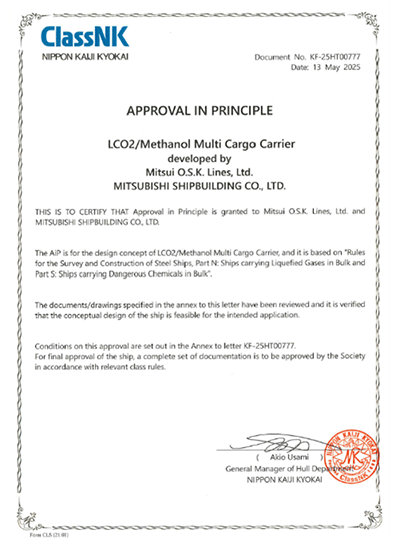Japanese shipbuilding giants Mitsui O.S.K. Lines, Ltd. (MOL) and Mitsubishi Shipbuilding Co., Ltd. today, June 30, 2025, announced an approval in principle (AIP) from ship classification society and a certifying body Nippon Kaiji Kyokai (ClassNK) for their jointly developed liquefied CO2 (LCO2) methanol carrier on heightened efforts to transition to green energy.
The AIP indicates that a certification body has reviewed the basic design of the subject equipment and confirmed that it meets technical requirements and relevant safety standards. In this case, the inspection was conducted based on the IGC Code (International Code for the Construction and Equipment of Ships Carrying Liquefied Gases in Bulk), IBC Code (International Code for the Construction and Equipment of Ships Carrying Dangerous Chemicals in Bulk), and ClassNK Classification Rules applicable to ships transporting liquefied gases and dangerous chemicals in bulk.
In a statement, both companies explained the technologies for converting CO2 into fuel or chemical products are attracting attention as a means of utilizing CO2 in CCUS (Carbon dioxide Capture, Utilization and Storage). One such approach is the ongoing study toward realizing a supply chain for producing synthetic methanol(Note3) from captured CO2. Synthetic methanol is expected to serve as one of the marine fuels that will contribute to decarbonization in the maritime shipping industry.
The vessel for which Mitsubishi Shipbuilding and MOL acquired AiP is based on a low-pressure LCO2 carrier. It aims to transport CO2, which serves as raw material, on outward voyages and synthetic methanol on return voyages. Use of dedicated vessels for CO2 or methanol results in empty-cargo operation on half of their trips. If dual transport of CO2 and methanol is achieved, empty-cargo trips can be eliminated, thereby improving overall transport efficiency.
MOL and Mitsubishi Shipbuilding will move forward with the development of the LCO2 / methanol carrier, building on the findings and technical challenges identified during the concept study. The goal is to achieve commercialization of the LCO2 / methanol carrier through collaboration with relevant companies in the supply chain and other partners.
The MOL Group is currently working to build supply chains for synthetic fuel/methanol and CO2 through initiatives such as its investment in HIF Global LLC(Note4), a U.S.-based company that develop, produce and transport synthetic fuel/methanol across North and South America and Australia. LCO2 / methanol carrier is expected to enhance the overall economic viability of such supply chains and contribute significantly to their realization.
In line with the “MOL Group Environmental Vision 2.2,” MOL is targeting net-zero emissions Groupwide by 2050. By further accelerating initiatives to transport CO2 as well as to develop and supply synthetic methanol, MOL aims to contribute to realization of a low-carbon or decarbonized society.
MHI Group is currently pursuing strategic measures to strengthen its business for the energy transition. In conjunction with this initiative, Mitsubishi Shipbuilding is making efforts to contribute to the advancement of the maritime industries in Japan and around the world by utilizing its shipbuilding-based marine engineering technologies in addition to conventional shipbuilding.
The development of LCO2 / methanol carrier is one example of these efforts. Collaboration with MOL also demonstrates MHI Group’s commitment to partnerships. Moving forward, Mitsubishi Shipbuilding will continue to build strategic global partnerships both to incorporate external expertise and actively advance the development of a CCUS value chain. Through these efforts, the company aims to provide its technologies, products and services to ever more customers.





